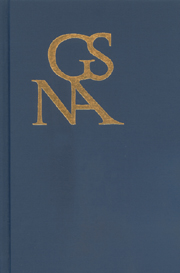Book contents
- Frontmatter
- Contents
- Special Section on Goethe and Idealism
- Introduction—Goethe and Idealism: Points of Intersection
- Goethe and Spinoza: A Reconsideration
- Goethean Intuitions
- Goethe's Notion of an Intuitive Power of Judgment
- “Idealism is nothing but genuine empiricism”: Novalis, Goethe, and the Ideal of Romantic Science
- The Quest for the Seeds of Eternal Growth: Goethe and Humboldt's Presentation of Nature
- Hegel's Faust
- Goethe contra Hegel: The Question of the End of Art
- Goethean Morphology, Hegelian Science: Affinities and Transformations
- Die Gretchenfrage: Goethe and Philosophies of Religion around 1800
- Civic Attachments & Sibling Attractions: The Shadows of Fraternity
- Margarete-Ariadne: Faust's Labyrinth
- Save the Prinz: Schiller's Geisterseher and the Lure of Entertainment
- Walsers Trilogie der Leidenschaft: Eine Analyse seines Goethe-Romans Ein liebender Mann im Kontext der Tradition der Ulrike-Romane
- Review Essay: What's New in the New Economic Criticism
- Book Reviews
Civic Attachments & Sibling Attractions: The Shadows of Fraternity
from Special Section on Goethe and Idealism
Published online by Cambridge University Press: 05 February 2013
- Frontmatter
- Contents
- Special Section on Goethe and Idealism
- Introduction—Goethe and Idealism: Points of Intersection
- Goethe and Spinoza: A Reconsideration
- Goethean Intuitions
- Goethe's Notion of an Intuitive Power of Judgment
- “Idealism is nothing but genuine empiricism”: Novalis, Goethe, and the Ideal of Romantic Science
- The Quest for the Seeds of Eternal Growth: Goethe and Humboldt's Presentation of Nature
- Hegel's Faust
- Goethe contra Hegel: The Question of the End of Art
- Goethean Morphology, Hegelian Science: Affinities and Transformations
- Die Gretchenfrage: Goethe and Philosophies of Religion around 1800
- Civic Attachments & Sibling Attractions: The Shadows of Fraternity
- Margarete-Ariadne: Faust's Labyrinth
- Save the Prinz: Schiller's Geisterseher and the Lure of Entertainment
- Walsers Trilogie der Leidenschaft: Eine Analyse seines Goethe-Romans Ein liebender Mann im Kontext der Tradition der Ulrike-Romane
- Review Essay: What's New in the New Economic Criticism
- Book Reviews
Summary
Presidential Address
THE OFFICIAL WEBSITE FOR THE EUROPEAN UNION explains its choice of the final movement of Beethoven's Ninth Symphony as the EU anthem in terms of universality:
For the final movement of this symphony, Beethoven set to music the “Ode to Joy” written in 1785 by Friedrich von Schiller. This poem expresses Schiller's idealistic vision of the human race becoming brothers—a vision Beethoven shared.… Without words, in the universal language of music, this anthem expresses the ideals of freedom, peace and solidarity for which Europe stands.
While this exegesis leans on the universality of a musical language, it also acknowledges the role of the lyrics to Schiller's ode in the choice of the anthem. The connection between brotherhood and freedom comes across as self-evident, enshrined as it is in the familiar slogan of the French Revolution, Liberté, Egalité, Fraternité. Like the ode and the French slogan, however, the EU web text manifests a series of paradoxes in the understanding of fraternity. Europe, it seems, in spite of its status as a politically discrete unit, here becomes the symbol of the universal. In fact, the web site calls the symphony the anthem “not only of the European Union but also of Europe in a wider sense.” In addition, the language of brotherhood is gendered in Schiller's German just as it is in the English description above.
- Type
- Chapter
- Information
- Goethe Yearbook 18 , pp. 205 - 222Publisher: Boydell & BrewerPrint publication year: 2011



